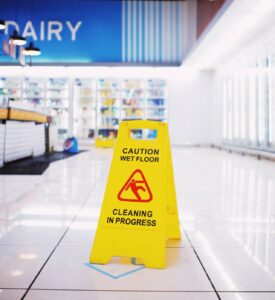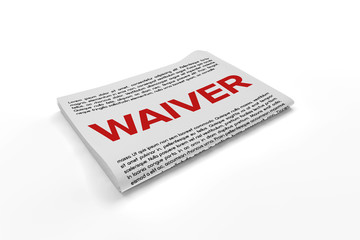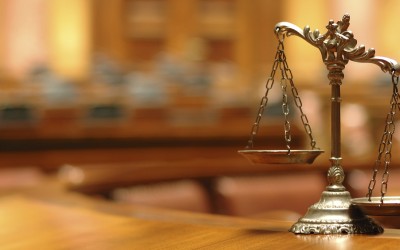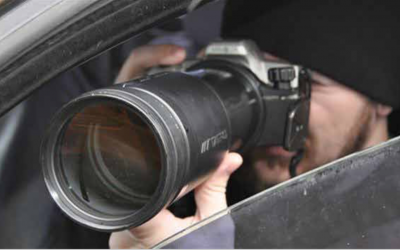What Are My Rights if I Slip and Fall in a Mall?

Slip and fall accidents are the most common type of personal injury claim in Nova Scotia. In the busy atmosphere of shopping malls, sometimes a slip and fall is an unavoidable accident. In most situations, conditions that contribute to a slip and fall are the result of someone failing to take reasonable steps to ensure the shopping centre is a safe environment for visitors. If you are injured in a slip and fall accident caused by someone’s negligence, you may be able to file a slip and fall claim to recover compensation.
How slip and fall accidents happen in malls
When we’re at the mall, we never expect to leave with an injury caused by a slip and fall. However, accidents can happen anywhere, anytime. The environment of the typical shopping mall can present a variety of unsafe conditions. Before entering the mall, customers may encounter snow and ice in the parking lots and on the sidewalks or uneven pavement. Once inside, the floors might be slippery from patrons tracking water in from outside or because the maintenance crew just finished mopping. Navigating around the shopping centre, customers could slip on spilled drinks in the food court or trip over a poorly maintained rug. Boxes, cords, and other objects left in store aisles can also cause shoppers to fall.
The list of potential hazards is endless. Regardless of the cause of the slip and fall accident, the legal responsibility of the shopping mall will depend on whether it had reasonable notice of the unsafe condition and a chance to fix it. For instance, if you fell on a drink spilled seconds before the fall, you may not have a strong claim. If the spilled drink was sitting on the floor for hours, your slip and fall claim has a higher chance of success.
Who is responsible for a slip and fall accident in a mall?
Like other private businesses, malls have a reasonable duty to maintain a safe environment. Under the Nova Scotia Occupiers Liability Act, the “occupier”, defined as the person who has control over the property (in this case, a mall), has a duty of care to take reasonable steps to keep visitors to the property safe from the risk of injury. If they fail in that duty, the occupier can be held liable for any injuries you might suffer from slipping or falling on their property. Specific shops in the mall can also be held responsible for injuries sustained on the premises due to negligence.
It’s important to note that occupiers are not held to a standard of perfection, only to a standard of taking “reasonable steps”. No property owner can prevent every potential accident from happening. For this reason, some considerations are taken into account when deciding if an occupier met the duty of care, including:
- Whether the occupier knew, or ought to have known, that the person was on the property.
- The circumstances of entry to the premises (e.g., if the person was there legally or trespassing).
- Any efforts the occupier made to warn people about the danger or discourage people from suffering the risk (e.g., warning signs or caution tape).
- Whether, under the circumstances, the occupier should reasonably have been expected to provide protection against the risk.
- The person willingly or voluntarily assumed the risk.
When determining if the occupier did take reasonable care to ensure the safety of the property and persons on the premises, the court will also consider maintenance standards, inspection logs, the size and use of the building, number of employees (at a commercial property), and weather conditions.
For example, in Tondat v. Hudson’s Bay Company, the Plaintiff entered a mall on a rainy day and slipped and fell after stepping on a wet tile floor. At trial, Hudson’s Bay provided expert evidence that the tile floor was designed to be slip-resistant when wet. The Court rejected this evidence because it did not account for other factors that could affect the slip-resistance of a floor in a high traffic area, such as the type of footwear worn by patrons and the possibility of other substances on the floor. The Court also found that, at the time of the fall, there was only one maintenance worker assigned on duty for the entire mall, and there was no record of any maintenance done in the area where the Plaintiff fell. The Court concluded that Hudson’s Bay did not act reasonably in the circumstances to ensure the safety of those who entered the mall.
Compensation for slip and fall lawsuits
When reasonable steps aren’t taken and an injury results, the injured person can seek compensation for the damages. Slip and fall accidents may not seem as severe as other cases, but they can result in serious injuries that significantly impact your quality of life. Some of the most common slip and fall injuries include:
- Neck, shoulder, and back injuries
- Broken bones and fractures
- Joint and soft tissue damage
- Spinal cord injuries, including paralysis
- Sprains and pulled muscles
- Traumatic brain injuries (TBIs)
- Internal organ damage
If you were injured due to a slip and fall accident in a mall, you might be entitled to compensation that will help restore you to the position you were in before the injury occurred. When calculating compensation for a slip and fall claim, the court will often consider your age, whether you have any pre-existing injuries or conditions, and whether you contributed to your injury. The money awarded in a settlement for slip and fall claims should be enough to cover expenses related to the injury, including medical bills, lost wages, pain and suffering, and damages to personal property.
How a slip and fall lawyer can help
Your potential compensation will depend on your injuries, the amount of evidence of those injuries, and who was liable. Determining the occupier or owner at-fault is not always clear-cut. For example, if you were injured inside one of the retail stores, you may have one claim against the store and a separate claim against the shopping mall. On the other hand, if you were injured on an escalator, a maintenance company might be at fault, along with the shopping mall or store, depending on where the escalator is located. A slip and fall lawyer can determine who the at-fault party is and fight for maximum compensation.
Insurance companies will try to pay as little as possible to claimants (the person bringing a slip and fall claim) who aren’t represented. Adjusters are skilled at presenting a “final offer”, knowing you will likely believe that you aren’t entitled to further compensation. After suffering an injury, most people are also overwhelmed with the medical bills and lost wages because they can’t work. An insurance claim lawyer (also called an accident lawyer) will communicate with the insurance company on your behalf while you focus on recovering. Our experienced team of Halifax slip and fall lawyers at Valent Legal will gather medical reports and evidence, calculate the costs associated with your injuries to increase the value of your claim, and negotiate settlements to recover the compensation you deserve.






















